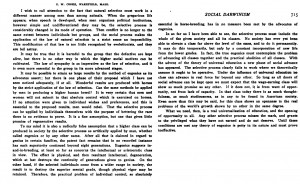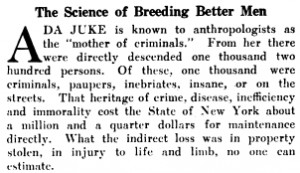Alexis Carrel, Nobel Prize Winner. Man the Unknown, 1939. [Source] A choice must be made among the multitude of civilized human beings. We have mentioned that natural selection has not played its part for a long while. That many inferior individuals have been conserved through the efforts of hygiene and medicine. But we cannot prevent …
Category: degeneration
Karl Pearson on ‘race-suicide’ (1907)
Quoted by Collin Wells in 1907: As Karl Pearson has recently said: The great problem is whether limitation has not begun at the wrong end. If a nation is to be strong, there must be wastage; the reckless and diseased must not be in a condition to multiply like the strong and able. At present …
Foster Kennedy: Euthanasia for “Nature’s Mistakes” up to the age of 5
Kennedy’s address at the 97th annual meeting of the American Psychiatric Association in 1941 encapsulates well how the acceptance of evolution and utilitarian thinking are tied into arguments for eugenics (and euthanasia), which is ironic, of course, since many advocates for euthanasia deny such connections and modern proponents of evolution become apoplectic at the insinuation …
Charles Galton Darwin: “Unconscious Selection”
From Charles Galton Darwin’s The Next One Million Years: [civilization has the tendency] to eliminate its ablest people. This has happened in the past, and is certainly happening now, and if it is always to happen, it signifies a recurrent degeneration of all civilizations, only to be renewed by the incursion of barbarians who have …
Eugenics as a Religion and Social Darwinism, Collin Wells
Source: Dr. Collin Wells, “Social Darwinism” a paper presented in 1907, found in The American Journal of Sociology, pages 706-709 Finally, what is the evolutionary value of certain ideals? Let us take individualism, the ideal of democracy, which has tacitly figured in many of the phenomena to which I have already referred. Let us go …
Child Labor Laws as Eugenics Policy
Source: Dr. Frank a Fetter, Cornell University, in a discussion of “Western Civilization and the Birth-Rate”, as found in The American Journal of Sociology, 1907, page 619. The paper mentions but one recent social change which tends definitely and positively to reduce the families of the unskilled classes, namely, child-labor legislation. Such laws as these …
Universal Education a Pre-Requisite for Effective Eugenics Policies
Source: G.W. Cooke, discussing ‘Social Darwinism’ in American Journal of Sociology 12 (March 1907), 714-715. Below the image is OCR scanned text. If anyone would like to send a cleaned edition, that would be greatly appreciated. I wish to call attention to the fact that natural selection must work in a different manner among men …
Scientific American: “The Science of Breeding Better Men” 1911
Editorial from a 1911 edition of Scientific American [Source]: Sci-Am’s Editor’s note: This editorial was written and published in 1911. Although our editors of a century ago pondered some lofty aspirations for the orderly future of humans, it was only three decades later that the brutal reality of a Nazi social order suffused with a …
Sydney Webb: The parasites should not be allowed to compete as wage-earners, for it prevents natural selection from working…
Sydney Webb in Industrial Democracy (regarding the minimum wage) – 1920 The problem of the Unemployable is not created by the fixing of a National Minimum by law. The Unemployable we have always with us. With regards to certain sections of the population, this unemployment is not a mark of social disease, but of social …
Julian Huxley: Population Control, Eugenics, and Birth Control all part of the same Program
Contemporary advocates for birth control exhibit no awareness whatsoever that birth control was always conceived in the context of ‘eliminating the unfit,’ ie., eugenics. Eugenics, in turn, was considered a straight-forward logical extension of Darwinism. Eugenics was seen as human control of human evolution, and was always tied into discussions on ‘population control.’ These are …



Recent Comments